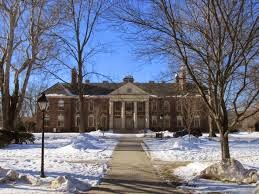The first martini I ever drank was likely a Smirnoff –
shaken, not stirred – presented with a nod and a wink by a careless bartender
at T.G.I. Friday's on East Sixty-Third. I would have been just thirteen on that
warm, hopeful Spring evening in 1968, dressed for success in tweed and khakis
and sporting on my left hand a brass curtain ring I'd found earlier in the junk
drawer and polished up for the occasion. I'd come across an item in Cue
Magazine about how all the single girls in the City were heading for bars
like this in the neighborhood to find men and, as I was looking for tipsy
single girls and had been told that I could pass for eighteen, I'd spent the
day sorting through patched jeans and tie-dyed shirts, rumpled corduroys and sport-coats
in an effort to find the appropriate outfit for impressing both a girl and a
bartender. Friday's was the flagship of the singles' scene and only a few
blocks from the house. I finally mustered the courage to walk over at around 7
o'clock and took a seat in the soft, shadowed section of the empty bar away
from the revealing glare of a faux Tiffany lamp. Resting my left hand
prominently on the polished mahogany and affecting my best, world-weary
demeanor, I ordered a martini because I figured I'd only get one shot at a
drink before the bartender wised up, so it might as well be the cocktail James
Bond favored.
Whereas the ersatz wedding band may have
helped persuade the barman to serve me, I knew as much about cocktails at the
time as I did about women and it never occurred to me that the ring might keep
the girls away or that the martini might, within a few sips, render me too
senseless to notice. After maybe forty minutes of sipping at the nasty
concoction I'd gotten most of it down and made a foray towards a booth where
two mod girls were playing backgammon, nursing green and yellow umbrella drinks
and flashing me what I must have decided were “come hither” looks. They giggled
as I stumbled on approach. “Leg's asleep...”, I offered, clinging to the brass
rail above their booth. “ Where do you go to school?” The pretty one opened
with, suppressing a giggle. “ What's that?” her friend asked, pointing to the
ring, “ You're not married.... What, how old are you, thirteen or something?”
Mortified and ashamed, I mumbled something about having to go – I think I told
them my mother was dying in Albany – and stumbled out the door with the sound
of their mocking laughter ringing in my ears all the way home.
Cocktails have returned as the height of
hipster fashion these days and much has been made lately of our country's
upcoming entry in the global USBG Legacy Cocktail Showcase competition, the Father's
Advice. An improbable concoction of rum, some sort of Sherry
something-or-other, Creme de Banana and a selection of spirits and cordials
I've never heard of, this deadly little trifle is bound to be the bomb of the
pork-pie hat and skinny-jean set and the bane of every long-suffering bartender
who's ever had to tolerate the White Russian or the Maraschino cherry.
In most of the bars I learned to drink in, shots of Jack and gin martinis were
about the most one could expect by way of a cocktail and even at that a request
for an olive or - God forfend – a twist,
might earn a glare and eye-roll from the mixologist. Any request that might
require a toothpick umbrella or even a swizzle-stick was generally made by a
slumming member of the Bridge-and-Tunnel set and was invariably met with a
sneer and a beer.
My father was a gin martini man and often
ordered one at lunch in those dark, obscure French or Italian restaurants that
dot the side-streets in Midtown. Although I doubt he ever had more than a
couple of the legendary three martini lunches, he could have at least one and a
couple of glasses of wine with a veal chop and side of fettuccine without
apparent ill effect. One afternoon when he was a couple of years older than I
am today, he and I were walking up the hill after a lovely repast at the River
Cafe. Halfway to the Heights he began to lurch and list, careening from curb to
cobblestone so wildly that I was forced, against my better judgment, to fling
my arms about him lest he fall. I remember thinking, with a tinge of public
embarrassment, that he must be plastered; yet I knew he'd had only two glasses
of Medoc with his broiled halibut. In a moment he'd regained his balance and
composure and brushed my arms and concerns away. Years later we were able to
pinpoint that episode as the first of the many strokes that would weaken and
diminish him over the course of his final fifteen years.
Dad never offered much advice about women
or drink, except perhaps the unsolicited suggestion one afternoon that I marry
Suzanne. A year or two before he died, my brother took him on a “voyage a la recherche”
to his past in Duluth. At a steakhouse somewhere in the wilds of Minnesota my
father ordered a martini. My brother, understandably weary and cautious after
several days with Dad, jumped in. “ Be careful, Dad,” he admonished, “you know
martinis make you choke.”
“Martinis don't make me choke.” He replied
with some annoyance, nodding to the waitress. “Martinis make me fall over!”
Seems like good advice to me.
Father's Advice
1 ½ oz Bacardi Gold
½ oz Cardamaro
½ oz Amontillado
¼ oz Giffard Banane du Bresil
Combine all ingredients. Stir
for 45 seconds, pour into chilled coupe glass and garnish with orange swath.
























